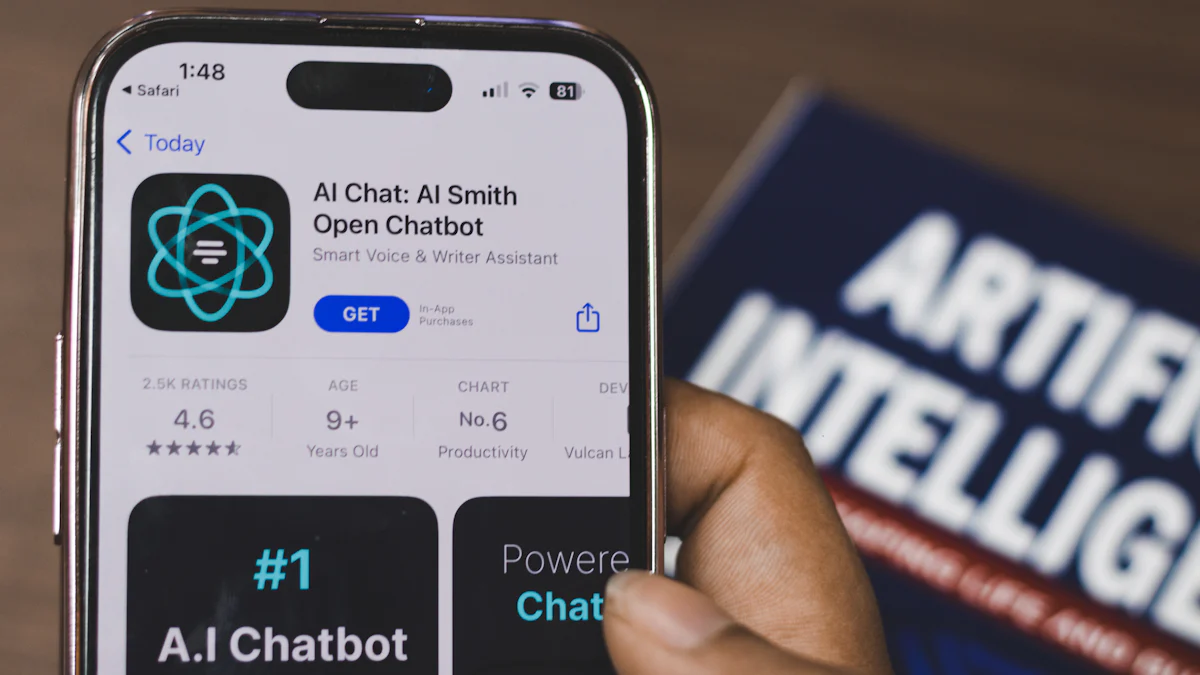AI Chatbots: Navigating the Pros and Cons

AI chatbots have become integral to various industries. These intelligent programs simulate human conversation using advanced technologies. The global AI chatbot market is projected to reach $27.2 billion by 2030. Almost 45% of customers willingly use chatbots for customer service. Businesses recognize the importance of understanding both the advantages and disadvantages of AI chatbots. Myloves, a platform offering an AI lover experience, exemplifies the growing trend. Reviews chatbot AI platforms highlight efficiency and potential challenges. Comprehensive knowledge of these aspects aids in informed decision-making and strategic implementation.
Understanding AI Chatbots
Definition and Functionality
What are AI Chatbots?
AI chatbots represent intelligent computer programs. These programs simulate human conversation using artificial intelligence and natural language processing. The term "chatbot" combines "chat" and "robot." AI chatbots engage users in dialogue, offering responses based on pre-defined algorithms and learning patterns.
How do they work?
AI chatbots operate through complex algorithms. These algorithms analyze user input to generate appropriate responses. Machine learning enhances chatbot capabilities by allowing adaptation over time. Natural language processing enables chatbots to understand and process human language. This technology allows chatbots to handle diverse queries with varying complexity.
Historical Context
Evolution of Chatbots
Chatbots have evolved significantly since the 1950s. Early chatbots relied on simple rule-based systems. Modern chatbots incorporate advancements in machine learning and artificial intelligence. These advancements enable more sophisticated interactions. The evolution of chatbots reflects ongoing technological progress.
Key Milestones in AI Development
Several milestones mark the development of AI chatbots. Siri emerged in 2011, revolutionizing voice-activated assistance. Watson from IBM demonstrated AI's potential in 2011. Cortana by Microsoft entered the scene in 2014. Google Assistant launched in 2016, enhancing user interaction. Alexa by Amazon became a household name in 2014. The introduction of BERT in 2018 improved natural language understanding. Duplex by Google showcased advanced conversational abilities in 2018. ChatGPT in 2020 set new standards for AI-driven dialogue. These milestones highlight significant progress in AI chatbot technology.
The Pros of AI Chatbots

Efficiency and Availability
24/7 Customer Support
AI chatbots provide continuous customer support. Businesses can offer assistance without interruptions. Customers receive help at any time of day. This availability enhances customer satisfaction. Traditional customer service methods cannot match this round-the-clock service.
Handling Multiple Queries Simultaneously
AI chatbots manage multiple conversations at once. This capability increases efficiency in handling customer inquiries. Businesses benefit from reduced wait times for customers. AI chatbots automate up to 88% of queries. Traditional methods struggle with such volume and speed.
Cost-Effectiveness
Reducing Operational Costs
AI chatbots reduce the need for extensive human resources. Businesses save on labor costs. Automated responses handle routine inquiries efficiently. This reduction in operational expenses benefits companies financially. Traditional customer service methods require more staff and resources.
Scalability for Businesses
AI chatbots offer scalability for growing businesses. Companies can expand customer support without significant investment. AI technology adapts to increased demand seamlessly. Businesses maintain quality service during peak times. Traditional methods may require additional hiring and training.
Enhanced User Experience
Personalization and Customization
AI chatbots provide personalized interactions. Customer data enables tailored responses. Users experience a customized journey based on preferences. This personalization fosters customer loyalty. Traditional methods may lack this level of customization.
Quick Response Times
AI chatbots deliver rapid responses to inquiries. Customers receive immediate assistance. Quick response times improve user satisfaction. Businesses enhance their reputation through efficient service. Traditional methods often involve longer wait times for customers.
The Cons of AI Chatbots

Limitations in Understanding
Lack of Emotional Intelligence
AI chatbots lack the emotional intelligence inherent in human interactions. Human empathy and understanding are absent in AI responses. Chatbots often struggle to provide comfort or reassurance during sensitive situations. Users may find chatbot interactions unsatisfactory when dealing with complex emotional issues. The absence of a human touch can lead to user dissatisfaction.
Misinterpretation of Queries
Chatbots frequently misinterpret nuanced or technical questions. Language barriers and cultural differences can exacerbate misunderstandings. Incorrect responses from chatbots can frustrate users. Misinterpretations can damage a brand's reputation. Many users prefer human interaction to avoid these pitfalls.
Privacy and Security Concerns
Data Breach Risks
AI chatbots pose significant data breach risks. Sensitive information exchanged during interactions can be vulnerable. Hackers target chatbots to access confidential user data. Businesses must implement robust security measures to protect user information. Failure to secure data can result in severe consequences for companies.
User Privacy Issues
User privacy remains a critical concern with AI chatbots. Chatbots collect vast amounts of personal data. Unauthorized access to this data can compromise user privacy. Companies must ensure compliance with data protection regulations. Transparent data handling practices are essential to maintain user trust.
Dependence on Technology
System Failures
AI chatbots depend heavily on technology infrastructure. System failures can disrupt chatbot functionality. Users may experience interruptions in service during outages. Businesses risk losing customer trust due to unreliable chatbot performance. Ensuring system reliability is crucial for maintaining service quality.
Over-reliance on Automation
Excessive reliance on AI chatbots can lead to over-automation. Human oversight is necessary to address complex queries effectively. Automation without human intervention can result in unsatisfactory customer experiences. Businesses must balance automation with human interaction to meet diverse customer needs. A strategic approach ensures optimal service delivery.
Introducing Myloves
Overview of Myloves
What is Myloves?
Myloves stands as a pioneering platform in the realm of digital companionship. The platform empowers users to create and interact with customizable AI lovers. This innovative service offers a unique experience by simulating lifelike conversations and interactions. Users can design their ideal AI lover, tailoring every detail to match personal preferences. The platform provides an engaging environment where users explore diverse narratives and characters.
Unique Features of Myloves
Myloves incorporates advanced technologies to enhance user interaction. Natural language processing (NLP) enables realistic dialogues, allowing for seamless communication. Text-to-image generation creates visual content that enriches the user experience. The platform also includes text-to-speech and speech-to-text capabilities for voice interactions. These features ensure a comprehensive and immersive experience for users seeking digital companionship.
How Myloves Utilizes AI Chatbots
Enhancing User Interaction
Myloves leverages AI chatbots to elevate user engagement. The platform's chatbots simulate human-like conversations, providing users with a sense of connection. Advanced NLP technology allows chatbots to understand and respond to user input accurately. This capability ensures meaningful interactions, enhancing the overall user experience. Users enjoy personalized dialogues that cater to individual preferences and desires.
Improving Customer Satisfaction
Myloves prioritizes customer satisfaction through its AI-driven approach. The platform's AI chatbots offer quick and efficient responses to user queries. This efficiency reduces wait times and enhances user satisfaction. The ability to handle multiple interactions simultaneously ensures seamless service delivery. Users benefit from a responsive and attentive experience, fostering loyalty and satisfaction. Myloves continues to innovate, ensuring that users receive the highest level of service.
Future Prospects and Best Practices
Emerging Trends in AI Chatbots
Integration with Other Technologies
AI chatbots continue to evolve through integration with other technologies. Businesses incorporate AI chatbots with customer relationship management systems. This integration enhances data analysis and customer insights. Chatbots also merge with Internet of Things (IoT) devices. This allows seamless interaction across various platforms. Integration with augmented reality (AR) and virtual reality (VR) creates immersive experiences. These advancements expand the potential applications of AI chatbots.
Advancements in Natural Language Processing
Natural language processing (NLP) advancements drive AI chatbot improvements. Enhanced NLP algorithms improve language understanding. AI chatbots now handle more complex queries with greater accuracy. Sentiment analysis capabilities allow chatbots to gauge user emotions. This enables more empathetic responses. Continuous NLP development promises even more sophisticated interactions. Businesses benefit from improved customer engagement and satisfaction.
Best Practices for Implementing AI Chatbots
Ensuring Data Security
Data security remains a top priority when implementing AI chatbots. Businesses must adopt robust encryption methods to protect user data. Regular security audits help identify vulnerabilities. Compliance with data protection regulations ensures user privacy. Transparent data handling practices build user trust. Companies must prioritize security to prevent data breaches.
Balancing Automation with Human Touch
Balancing automation with human interaction is crucial for effective chatbot implementation. AI chatbots handle routine inquiries efficiently. Complex or sensitive issues require human intervention. Businesses should provide easy access to human support when needed. A hybrid approach ensures optimal customer service. This balance enhances user satisfaction and loyalty.
Reviews Chatbot AI
User Feedback and Experiences
Positive Reviews
AI chatbots have garnered significant attention in the customer service sector. Many users appreciate the efficiency and availability of AI chatbots. The ability to provide 24/7 support stands out as a major advantage. Users often highlight the quick response times and personalized experiences. Kortical emphasizes that AI chatbots can transform the customer service landscape by learning from interactions. This capability allows chatbots to deliver tailored experiences, enhancing user satisfaction. The integration of natural language processing (NLP) further improves conversational quality. Users find the human-like interactions engaging and efficient.
Areas for Improvement
Despite the positive feedback, AI chatbots face several challenges. Users report issues with understanding complex or nuanced queries. FDG Web notes that AI chatbots struggle with intricate requests. Misinterpretations can lead to user frustration. Privacy concerns also arise due to data handling practices. Users worry about potential data breaches and unauthorized access. Synoptek highlights the importance of ethical and unbiased use of AI chatbots. Implementing best practices can mitigate these risks. Users also express concerns about the costs associated with chatbot implementation. Balancing automation with human oversight remains crucial for optimal performance.
Industry Insights
Expert Opinions
Experts in the field recognize the transformative potential of AI chatbots. Forbes highlights the widespread adoption of conversational AI. Unlike traditional chatbots, conversational AI uses NLP for more sophisticated interactions. Experts emphasize the need for chatbots to refer complex queries to human agents when necessary. This approach ensures that users receive accurate and satisfactory responses. Aivo suggests that AI chatbots can automate routine tasks. This automation allows human agents to focus on more complex inquiries. The combination of AI and human expertise enhances overall service quality.
Market Trends
The AI chatbot market continues to evolve with emerging trends. Integration with other technologies expands the capabilities of AI chatbots. Businesses incorporate chatbots with customer relationship management systems. This integration enhances data analysis and customer insights. Sunderland Software City points out that AI chatbots serve as valuable tools for smaller organizations. These businesses benefit from cost savings and resource optimization. Market trends indicate a growing reliance on AI chatbots for customer service. Companies strive to balance automation with human interaction for optimal results.
AI chatbots offer significant advantages, including 24/7 availability and cost efficiency. However, challenges such as misunderstandings and privacy concerns persist. Businesses must adopt a balanced approach when integrating AI chatbots into their strategies. A focus on ethical use and best practices ensures optimal outcomes. Staying informed about AI advancements is crucial for leveraging future opportunities. Organizations should evaluate specific needs and resources to maximize benefits while minimizing risks.
See Also
Top Tips for Evaluating AI Roleplay Chatbots
Enhancing Roleplaying with AI Chatbots
Mastering AI Roleplay Chatbot Usage
Top AI Roleplay Chatbots of 2024: User Feedback and Functions
Top AI Chat Platforms 2024: Optimal Options for Online Chats